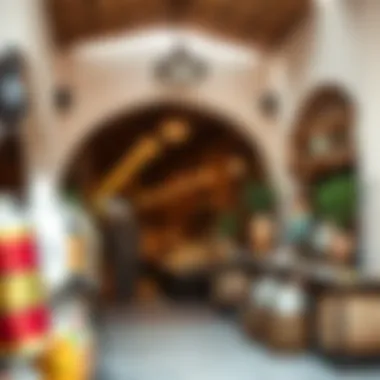Living in the UAE: Insights and Practical Tips


Intro
Living in the United Arab Emirates (UAE) is not just a geographic choice; it’s a journey into a kaleidoscope of cultures, opportunities, and challenges. The UAE has become a global hub, drawing individuals from all corners of the world for its vibrant lifestyle, business prospects, and strategic location. As the pulse of innovation beats through cities like Dubai and Abu Dhabi, understanding the nuances of living here is essential for anyone looking to plant roots or invest in this dynamic region.
In this guide, we’ll peel back the layers on various aspects of life in the UAE, from legal frameworks that define residency to cultural insights that influence daily life. We’ll also delve into the cost of living, a crucial factor whether you’re a local or an expatriate, and explore real estate opportunities, spotlighting areas that are ripe for investment.
Your journey may include strolling through bustling souks, mastering the intricate local etiquette, or navigating the real estate market’s peaks and troughs. Whatever your objectives—be it relocating for work, starting a business, or simply seeking a new adventure—this guide serves as your compass through the UAE’s multifaceted landscape.
Market Insights
Current Trends in Dubai Real Estate
Dubai’s real estate scene continues to evolve, characterized by a blend of luxury and practicality. Investors and potential homeowners should keep an eye on emerging trends that can dictate property values and market demand. The market has been recovering from the pandemic effects, showcasing a boost in demand for villas and townhouses. Not surprisingly, buyers are increasingly leaning towards spaces that offer additional comfort and privacy.
Moreover, the introduction of longer-term visas is providing a fresh breath to the market, allowing buyers to feel more secure in their investments. This stability encourages growth not only in the luxury sector but also in more affordable segments. As such, it’s a prime time for individuals looking at real estate as a long-term investment.
Impact of Economic Factors on Property Prices
When considering property in the UAE, it’s crucial to factor in how economic conditions can sway the market. The fluctuation of oil prices, for instance, can send ripples through the economy, impacting wages and spending. Thus, potential buyers should stay abreast of global economic shifts that might affect local markets.
Furthermore, government initiatives, such as economic diversification plans and foreign investment incentives, can significantly enhance property scenarios. Buyers are advised to consider these economic foundations when projecting future growth and stability in their real estate investments.
"Dubai’s real estate landscape is akin to a chess game; understanding the moves of economic factors can lead to a checkmate in investment success."
Investment Opportunities
Best Neighborhoods for Investment
Investing in Dubai real estate requires keen insight into the neighborhoods surging in popularity. Areas like Dubai Marina and Downtown Dubai often steal the spotlight, but emerging neighborhoods are rounding out the competition. Locations like Dubai Hills Estate and Mohammed Bin Rashid City offer a balanced mix of luxury living and community amenities, appealing to families and professionals alike.
In addition, districts such as Jumeirah Village Circle are increasingly becoming attractive due to growing infrastructure and affordable housing options. When assessing investment potential, look for areas with upcoming projects, easy access to public transport, and proximity to key landmarks.
Emerging Real Estate Projects in Dubai
The horizon of Dubai’s skyline is perpetually rising, with new and exciting projects continually in development. Noteworthy upcoming projects include the Dubai Creek Tower, which promises to redefine the skyline while enhancing urban living experiences. Additionally, the Project Dubai 2040 urban master plan aims to set the stage for sustainable growth and urbanization, making it a landmark point for future real estate investments.
Investors should stay informed about these developments. Awareness can lead to better timing and improved investment outcomes. Engaging with real estate platforms or forums can provide invaluable insights into the latest opportunities as they arise.
Understanding the UAE: An Overview
Understanding the UAE goes beyond mere geography and delves into the rich tapestry of its culture, history, and modernity that intertwines within its borders. For anyone considering moving or investing in this vibrant region, a grasp of its essence becomes crucial. This section aims to shed light on vital aspects that characterize the nation, focusing on geographical peculiarities, the diversity of its emirates, and historical milestones that frame today's UAE.
Geographical and Cultural Context
The United Arab Emirates, a federation of seven emirates, sits at the crossroads of Europe, Asia, and Africa. This strategic location has historically made it a nexus of trade and cultural exchange. Each emirate contributes its unique flavor to the overall national identity.
The UAE is more than just towering skyscrapers and gleaming malls. The desert landscapes, coastal waters, and mountain ranges form a diverse geography that attracts both tourists and residents alike. Cultural context plays a pivotal role in shaping social interactions and influences every facet of life, from business dealings to family gatherings.
The blend of traditional Arab customs, particularly in the more conservative emirates like Abu Dhabi, with a modern lifestyle reflects the duality of old meets new. Visitors and residents alike will find that understanding local customs, such as the significance of hospitality and respect for traditions, is crucial for building relationships and navigating social landscapes.
Key Emirates and Their Characteristics
Each emirate in the UAE brings its characteristics to the federal tapestry. Here’s a brief overview:
- Abu Dhabi: Known as the capital, it houses sovereign wealth funds and oil resources. Abu Dhabi is also home to many government institutions and offers a more traditional lifestyle compared to its neighbor, Dubai.
- Dubai: The economic powerhouse, often regarded as the glitziest of them all. Its rapid transformation into a global city with a focus on luxury tourism, real estate, and commerce sets it apart.
- Sharjah: Renowned for its rich cultural scene and museums, Sharjah offers a more conservative environment compared to Dubai, focusing on preserving the emirate's heritage.
- Ajman, Umm Al-Quwain, Fujairah, and Ras Al Khaimah: These emirates present their niches, from coastal beaches to the mountains, each promising unique lifestyle and opportunities for both residents and investors.
By grasping the characteristics of these emirates, potential residents learn crucial information that shapes both lifestyle choices and investment strategies.
Historical Development of the UAE
The history of the UAE is fascinating and layered. Originally a collection of coastal settlements involved in pearl diving and fishing, the discovery of oil in the 20th century radically transformed the area's fortunes. In 1971, the federation emerged as seven emirates united for the common good, driven by shared ambitions and resources.
The rapid modernization that followed—both infrastructurally and socio-economically—established the UAE as a significant player on the global stage. Today, it is known for hosting international events, fostering innovation, and maintaining a robust economy.
The rich story of the UAE is not merely a narrative of wealth and development; it reflects resilience and a forward-thinking spirit that drives the nation towards continuous growth. Understanding this historical context helps newcomers appreciate the societal shifts and the contemporary dynamics that set the UAE apart from its neighbors.
"The United Arab Emirates stands as a testament to the possibilities that arise when tradition and modernity fuse harmoniously."
Through this overview, prospective residents and investors can contextualize their choices and tap into the opportunities that living in the UAE presents. As they embark on their journey, a profound understanding of the UAE's geographical, cultural, and historical layers enriches their experience and fuels informed decisions.
Legal Framework for Residents
Navigating the legal environment of the UAE is essential for anyone considering a move or a longer stay. Understanding the legal framework helps both residents and expatriates to feel secure and informed while integrating into this vibrant society. It provides a roadmap for everything from securing employment to ensuring you have the right permits and protections in place.
Residency and Work Permits
When setting foot in the UAE, one of the first steps is obtaining a residency or work permit before you even think about unpacking those bags. This permit essentially acts as a golden key, allowing individuals to live and work legally in the country. The process, though comprehensive, is quite clear-cut if you come prepared.
To begin with, an expatriate typically needs sponsorship from a designated employer to obtain a work permit. An employment contract must be in place, and the employer plays a significant role in this process. The initial approval is granted by the Ministry of Human Resources and Emiratisation, which flips the light switch on your employment journey.
It’s worth mentioning that the UAE has recently introduced new initiatives aimed at attracting skilled professionals from various sectors. This means that if you possess specialized skills, you might find new pathways available that could streamline the licensing process.
Understanding Visa Types and Regulations
The UAE offers a cornucopia of visa types tailored to different needs. There’s no single-size-fits-all scheme here. Whether you aim to stay as a tourist, join your family, or secure employment, understanding these regulations is crucial to avoid any hiccups along the way.
Here are some commonly sought visas:
- Tourist Visa: Ideal for those visiting the country for leisure, it’s usually valid for a short term.
- Employment Visa: Tied to your job, it allows you to remain in the UAE as long as you’re with your sponsoring employer.
- Family Visa: This one’s for expatriates looking to bring family members to join them in the UAE.
- Investor Visa: A glimmer of hope for business-minded individuals looking to set up shop in the UAE.
Keeping abreast of the regulations is vital since visa requirements can shift with little notice. Make it a habit to check relevant government sites like u.ae for the latest updates. Ignorance can land you in hot water, so staying informed is half the battle won.
Maintaining Legal Status
Once you’ve nailed down your residency and visa details, the next step is ensuring that this status stays valid.
This includes:
- Renewing Visas: Most visas have an expiry date. Mark your calendar well in advance to renew on time; it’s better than grappling with fines!
- Changing Employment: If you switch jobs, remember that your new employer must apply for a work permit for you again. Be careful not to jump ship without proper documentation.
- Compliance with Local Laws: The UAE has specific laws that govern many aspects of life, from labor rights to housing agreements. Noncompliance can jeopardize your legal standing.


In the ever-evolving landscape of rules, maintaining your legal status is paramount for a smooth experience.
"Navigating the legal framework in the UAE requires diligence and a proactive approach to avoid pitfalls and ensure a smooth living experience."
In summary, a solid grasp of the legal framework for residents of the UAE can set you on a path to success while avoiding unnecessary complications. Knowledge truly is power when it comes to living in this dynamic and rich environment.
Cost of Living in the UAE
Understanding the cost of living in the UAE is essential for anyone considering making this dynamic country their home. This insight is not simply about crunching numbers; it also encompasses the lifestyle adjustments one might need to embrace. The UAE is known for its luxurious lifestyle, but this doesn't mean that living here isn't manageable on various budgets. Let's break down the main aspects of living expenses in the UAE, which are crucial for comfortable day-to-day living and for making informed decisions regarding investment and relocation.
Housing and Real Estate Expenses
Housing can often feel like the elephant in the room when discussing living costs. Generally, you're looking at a few options: renting an apartment, a villa, or even investing in property outright.
- Renting: If renting, locations like Dubai and Abu Dhabi can be pricey, with one-bedroom apartments in the city often ranging from AED 5,000 to AED 12,000 monthly, depending on the area. A luxury neighborhood such as Dubai Marina, renowned for its waterfront views, may come with a heftier price tag.
- Buying Property: For those contemplating purchasing, the UAE offers a variety of investment opportunities. Properties in growing areas like Dubai South or Ras Al Khaimah can provide good returns. However, potential buyers should be cognizant of property taxes and fees that can total upwards of 7-8% of the property's value at the time of purchase.
- Property Maintenance: Besides rent or mortgage, keep in mind that maintenance costs can add up. Condominiums tend to have homeowners’ associations (HOAs) that charge for upkeep, while standalone villas might require a good chunk of change for garden maintenance or pool cleaning.
Utilities and Daily Expenses
When it comes to utilities and daily expenses, it’s important to be ready for some variability based on lifestyle choices.
- Utilities: The average monthly utility bill can range from AED 300 to AED 800, depending on the size of the residence and personal habits. Seasons can impact cooling costs significantly — think sweltering summer days when air-conditioners are running non-stop.
- Grocery Prices: Daily necessities such as groceries could set you back around AED 600 to AED 1,200 a month for a single person. Imported goods are relatively expensive, so it may be beneficial to shop local when possible. Most residents often choose larger hypermarkets like Carrefour or Lulu for a more extensive selection at reasonable prices.
- Dining Out: Eating out can be a double-edged sword in the UAE. Depending on where you choose to dine, your costs could range significantly. A meal at an inexpensive restaurant can cost around AED 40, whereas fine dining can reach up to AED 700 or more per person.
Transportation Costs and Options
Getting around in the UAE is relatively straightforward, thanks to well-developed infrastructure and multiple transport options.
- Public Transport: The Dubai Metro is a reliable choice for many, with fares typically between AED 3 to AED 7 per trip, making it an affordable option for daily commutes. The public bus system is another viable option and offers extensive coverage across the emirates.
- Driving Costs: If you’re leaning more towards driving, consider that fuel prices are relatively low, averaging around AED 2.50 per liter. However, owning a car brings additional costs such as insurance, maintenance, and parking. Monthly parking fees can add an extra AED 300 to AED 1,500 depending on your location.
- Ride-Hailing Services: If public transportation doesn't fit your schedule, services like Uber or Careem are prevalent. Keep in mind that ride-hailing can be more costly than public transport, but might be more convenient for late-night outings or areas not easily accessed by train or bus.
Understanding the cost of living is essential for integrating smoothly into the UAE's cultural fabric. Each dollar spent can reflect indirectly on your lifestyle and ease of adaptation.
In summary, thoroughly evaluating housing, utilities, daily expenses, and transportation can equip you with a clearer picture of what to expect when living in the UAE. Managing these costs astutely can play a crucial role in maximizing your experiences while embracing life in this vibrant region.
Cultural Insights
Understanding cultural insights is vital for anyone considering living in the UAE. The nation stands at the crossroads of tradition and modernity, offering a rich tapestry of customs that intertwine with its rapid development. This understanding not only helps in social interactions but also plays a crucial role in navigating the various aspects of daily life, from business dealings to personal relationships.
Social Norms and Etiquette
In the UAE, social norms reflect the country’s Islamic heritage and diverse population. It's not uncommon to see traditional dress coexisting with contemporary clothing. This blend of cultures means you might find a person in an Emirati kandura chatting with someone in Western attire, lounging over coffee in a mall cafe.
Respect for personal space is important. A good rule of thumb is to keep a comfortable distance when speaking. Additionally, greetings often involve a handshake, but it's polite to wait for the other party to initiate contact, especially with females. The realm of gender interactions can be intricate; many locals prefer to maintain modest behavior in public settings.
Navigating social invitations also requires a level of understanding. When invited to a local's home, it’s considerate to dress modestly and bring a small gift. If your host offers food or drink, accept graciously, as declining can be viewed as impolite.
Religious Practices and Observances
Living in the UAE means being surrounded by a society that takes its Islamic heritage seriously. Religious observances influence daily life across the emirates. For instance, during the holy month of Ramadan, Muslims fast from dawn until sunset, which means that it's important for non-Muslims to be mindful of this tradition. Eating, drinking, or smoking in public during daylight hours can lead to unintended offense.
Exploring religious sites, such as the Sheikh Zayed Grand Mosque, offers insights into this intriguing culture. It's advisable to dress conservatively when visiting these sacred spaces and to follow any visitor guidelines meticulously.
Dining Etiquette and Culinary Diversity
The UAE’s culinary scene reflects its cultural diversity, with flavors from around the globe. Dining is often a communal affair, and sharing dishes is the norm. It’s common to find a mixture of Middle Eastern, Asian, and Western cuisines presented in lavish buffets or intimate settings.
When dining with Emiratis, it's essential to know a few dining customs. Always use your right hand for eating—using the left is seen as impolite. Traditional dishes like shawarma, biryani, and dates frequently grace the table. Don’t be surprised if your host insists on refilling your plate; they pride themselves on hospitality.
"A guest is a gift from God", is a saying that speaks volumes about the importance of hospitality in Emirati culture.
Education System in the UAE
Understanding the education system in the UAE is vital for anyone considering a move to this dynamic country. Education here is not merely a formality; it's a robust platform that shapes the future of its youth and contributes significantly to the national development. With a focus on modern educational practices blended with cultural insights, the UAE aims to prepare its students for a global future. Factors such as varying curricula, types of institutions, and the emphasis on extracurricular activities all play a role in defining the educational landscape. Moreover, the education sector reflects the UAE's commitment to fostering innovation and sustainability within its populace, making it a crucial aspect for potential residents and investors.
Types of Educational Institutions
The UAE boasts a diverse range of educational institutions that cater to various needs and preferences. These can be broadly categorized into:
- Public Schools: Funded by the government, these schools primarily follow the UAE's national curriculum, which emphasizes Arabic and Islamic studies. Education here is free for Emirati citizens, making it a preferred option for many families.
- Private Schools: A plethora of private institutions offers different curricula such as the British, American, International Baccalaureate (IB), and more. These schools often come with different privileges, including smaller class sizes and advanced facilities, attracting expatriate families.
- Higher Education Institutions: The UAE is home to several internationally recognized universities and colleges, such as the American University of Sharjah and Khalifa University. They offer degrees in various fields and often collaborate with global educational entities.
- Vocational Institutions: Aimed at equipping students with practical skills, these institutions focus on technical and vocational training. They are invaluable for students looking to enter the workforce directly after school.
Curricula and Academic Standards
Academic standards in the UAE are notably high, driven by both governmental policies and the private sector's competitiveness. The following points highlight the academic landscape:
- Curriculum Diversity: The multitude of curricula available provides parents and students the opportunity to choose a system that best fits their educational philosophy and future aspirations. The affordability of international curriculums can be a factor in this decision.
- Quality Assurance: The UAE’s Ministry of Education regulates public and private schools, ensuring they adhere to specific educational standards. This focus on quality education is evidenced by routine inspections and assessments.
- Public and Private Partnerships: Collaborations between educational institutions and various industries enhance curriculum relevance, ensuring students learn applicable skills. This integration is essential in nurturing a skilled workforce.
- Emphasis on Arabic Language: With Arabic as the official language, schools often integrate it into their curriculums, promoting bilingualism among students. This approach reinforces cultural identity alongside global competencies.
Extracurricular Activities and Community Involvement
Extracurricular activities play a significant role in the education system, fostering holistic development among students. Here's how:
- A Broad Range of Activities: Schools offer various extracurricular options, including sports, arts, music, and leadership programs. This diversity allows students to explore their interests and build teamwork skills.
- Community Engagement: Schools often engage with local communities through events, volunteer programs, and partnerships. This involvement encourages students to take an active role in civic life, preparing them for future responsibilities.
- Skill Development: Beyond the classroom, these activities help students develop essential soft skills. Communication, collaboration, and problem-solving abilities are nurtured through various group projects and performances.
Extracurricular involvement has been shown to enhance student motivation and overall academic performance, creating a balanced educational experience.
- Cultural Exposure: Many institutions celebrate cultural diversity through festivals and international days, fostering an understanding of different cultures among students. This exposure is key in a multicultural society like the UAE.
Healthcare Services in the UAE
Healthcare in the UAE plays a pivotal role in ensuring the well-being of its residents, making it a critical aspect for anyone considering moving or investing in the region. With a notable focus on both modern facilities and emerging health trends, the importance of understanding the healthcare framework cannot be understated. The UAE boasts a comprehensive healthcare system that is continually evolving, reflecting both the country’s affluent status and its commitment to high-quality medical care.
In a landscape where diverse populations converge, healthcare services are tailored to meet a myriad of needs. Expats and locals alike benefit from a system that emphasizes accessibility, innovation, and quality. This section aims to dissect the various components of healthcare services, including its structural makeup, insurance requirements, and how to effectively navigate medical facilities.
Structure of Healthcare System
The healthcare system in the UAE is structured into two main categories: public and private sectors. The government provides public services that are partly funded through a variety of local health authorities, such as the Department of Health in Abu Dhabi and the Dubai Health Authority.
- Public Healthcare: Generally covers resdents who have held a UAE residency visa for a minimum period and have access to primary and secondary care. Services provided often come at little to no cost for citizens, while expatriates might need to get insurance coverage first.
- Private Healthcare: Offers quicker access and more specialized services compared to public health facilities. Private hospitals and clinics are scattered throughout urban areas, equipped with advanced technology and staffed by international teams. This part of the system has become increasingly popular among expats seeking immediate care.
Overall, the healthcare system aims for a blend of quality and accessibility, striving to cater to all demographics in the UAE.
Health Insurance Requirements


With the introduction of mandatory health insurance in the UAE, every resident is required to obtain a plan that meets basic requirements set by local authorities. Each emirate has specific regulations, but common elements include:
- Minimum Coverage: Health insurance must cover essential health services, including emergencies and maternity care.
- Employer Sponsorship: Many employees receive health insurance through their employers, though options vary based on job title and salary.
- Private Plans: Expats and some locals opt for private plans that offer broader coverage and access to premium healthcare establishments.
Navigating through the health insurance landscape can feel daunting; however, being aware of these key requirements simplifies the process significantly.
Accessing Medical Facilities
Accessing medical facilities in the UAE is relatively straightforward, thanks to a well-established network of hospitals and clinics. Most cities, especially Dubai and Abu Dhabi, offer numerous options:
- Emergency Services: The emergency numbers are easy to remember: 999 for police and 998 for ambulance services. Emergency rooms are generally well-equipped and responsive.
- Specialist Clinics: For specific medical needs, residents can access specialist clinics ranging from dental to orthopedic care. Many of these facilities operate on an appointment basis, so calling ahead is prudent.
- Online Health Services: With the emergence of technology in healthcare, many services now offer telemedicine options, allowing people to consult with doctors remotely, a boon especially for expats unfamiliar with local medical practices.
In summary, while the healthcare landscape in the UAE might initially seem complex, a closer look reveals a well-oiled machine designed for both efficiency and effectiveness. Whether you're seeking routine check-ups, emergency services, or specialized care, the resources at hand provide peace of mind in what can often be a new and overwhelming environment.
"A well-structured healthcare system reflects the priorities of its society. In the UAE, the dedication to health and wellness is evident in every medical encounter."
For more details on the healthcare regulations, you can refer to UAE Government Portal or Wikipedia.
By grasping these elements, residents can better navigate the healthcare offerings of the UAE, ensuring they receive optimal care tailored to their needs.
Real Estate Market Analysis
The real estate market in the UAE is not just a haven for investors but also an essential pillar for understanding the economy and lifestyle of the region. In recent years, the property sector has seen a whirlwind of activity, transforming it into a large part of its economic infrastructure. Analyzing the real estate market is crucial for various stakeholders, including investors, homebuyers, and agents, who must understand the nuances and elements that influence property transactions. This section will delve into current trends in property investments, popular neighborhoods, and crucial aspects of understanding rental agreements.
Current Trends in Property Investments
The UAE property market is constantly evolving, dictated by various economic indicators, demographic shifts, and governmental policies aimed at stimulating growth. Foreign investment is on the rise due to favorable laws, which now allow 100% ownership of certain property types. For instance, areas like Dubai's Expo 2020 site have been marketed as prime investment locations after significant infrastructure upgrades. Conversely, potential investors need to be aware of fluctuating market prices caused by oversupply in specific areas.
Recent data indicates a moderate price stabilization, suggesting a more balanced market than in previous years. Trends show a shift towards affordable housing options owing to an influx of expatriates looking for budget-friendly accommodations. Furthermore, as smart city initiatives take root, properties featuring advanced technologies and sustainability measures are becoming increasingly desirable. Land buyers are likely to appreciate developments such as the Dubai South’s integrated lifestyle communities or Abu Dhabi’s Al Reem Island, both showcasing modern designs blended with practical living.
Popular Neighborhoods and Property Types
In terms of real estate, certain neighborhoods have gained favorable reputations among investors and residents alike.
- Dubai Marina is vibrant, offering waterfront living that attracts both young professionals and families.
- Jumeirah Lake Towers is a blend of residential and commercial vibes, favoring a cosmopolitan lifestyle.
- Abu Dhabi’s Al Maryah Island is becoming a business hub with luxurious apartments, appealing to high-income professionals.
Property types sought after include:
- Luxury apartments in high-rise towers with stunning views.
- Villas, particularly in gated communities like The Springs or Arabian Ranches, which cater to families.
- Commercial spaces, especially in areas like Business Bay, are seeing a surge as the economy opens up.
These neighborhoods are often marketed as not just places to live but as communities that offer amenities such as parks, schools, and shopping, creating a balanced lifestyle for residents.
Understanding Rental Agreements
Rental agreements in the UAE can be a bit tricky, given the varying regulations across emirates. When you decide to rent a property, it is crucial to pay attention to the lease terms and conditions. The majority of leases typically follow a standard format but can include unique clauses specific to the landlord's preferences.
Here are essential components to examine:
- Duration of the Lease: Usually 1 year, but terms can vary.
- Rent Payments: A common practice is paying upfront for the year or in two to four instalments. Be wary of late payment fees.
- Maintenance Responsibilities: This can be a grey area. Ensure clarity on who is liable for repairs.
- Utilities: Know which are included in your rent and which are not. Some landlords include water and electricity, while others do not.
When in doubt, it's wise to consult experts or refer to local real estate laws for guidance, as misunderstandings can lead to disputes.
"Understanding the intricacies of the UAE’s real estate landscape is not just about buying or renting a property; it's about making informed decisions that can significantly impact your life in the UAE."
Navigating the real estate sector can be complex, but with awareness of these trends, neighborhoods, and agreements, investors and residents can make decisions that serve their interests well.
Economic Landscape of the UAE
The economic landscape of the UAE is a vibrant tapestry woven from diverse industries and historic growth. Understanding this framework is essential for anyone considering a move to this dynamic region. The UAE's economy is not just about financial gain; it reflects a culture that embraces innovation and development. From a robust real estate market to emerging tech hubs, the economic opportunities are plentiful. Whether one is an investor, a homebuyer, or an enthusiastic manager, knowing the economic pulse of the UAE provides the necessary insights to navigate potential challenges and seize advantages.
Key Industries Driving the Economy
A closer look at the key industries driving the economy reveals several pillars that keep the wheels of prosperity turning. Here are a few significant contributors:
- Oil and Gas: Historically, oil has been the crown jewel of the UAE’s economy. Although its dominance is gradually declining due to diversification efforts, it still plays a critical role in generating revenue and funding large-scale developments.
- Tourism: The UAE, with its world-class attractions like the Burj Khalifa and Dubai Mall, has positioned itself as a global tourist hotspot. This industry not only boosts local businesses but also creates numerous job opportunities.
- Real Estate and Construction: The real estate market is another heavyweight, continuously evolving with ambitious projects. Cities like Dubai and Abu Dhabi are showcases of architectural grandeur.
- Finance and Banking: The UAE boasts a sophisticated banking system with a multitude of financial service providers, making it an attractive hub for economic activities in the region.
- Manufacturing: While not the most dominant, manufacturing is steadily gaining traction, particularly in areas like food processing and beverages, bolstered by favorable regulations for foreign investment.
Employment Opportunities and Wages
When navigating the job market in the UAE, employment opportunities and wages vary by sector and skill level. The demand for skilled labor is high, especially in the technology, healthcare, and engineering fields. Typical foreigners can secure competitive salaries, often coupled with attractive benefits like accommodation and health insurance. Here’s a quick snapshot:
- Skilled Talents: In IT and engineering roles, professionals can command salaries that might even outshine their counterparts in Western countries.
- Unskilled Labor: Conversely, wages for unskilled labor are generally lower, reflective of the region's economic structure.
- Job Types: While full-time positions dominate the market, part-time and freelance opportunities are on the rise, particularly among digital nomads.
Furthermore, expatriates often find that network-building is key. Many companies prefer hiring through referrals, so making connections can be of utmost importance.
Taxation and Financial Obligations
Another consideration when living in the UAE revolves around taxation and financial obligations. One of the main draws for many moving to the UAE is the lack of personal income tax, which offers significant savings. However, potential residents should be aware of certain aspects:
- Corporate Tax: While individuals do not pay income tax, companies must comply with corporate tax regulations, which can be as high as 9% for profits exceeding a specific threshold in sectors like oil and banking.
- Value Added Tax (VAT): A 5% VAT is applied to most goods and services, which is essential to understand for budgeting purposes.
- Other Fees: Various licensing fees and municipal charges can add up, particularly in business activities. Parking and other permits may incur additional expenses as well.
Staying informed is key; keeping abreast with changes to regulations can save both headaches and money in the long run.
In summary, the economic landscape of the UAE offers vast opportunities, though they come with their own challenges and obligations. As you delve deeper into the workings of this unique region, understanding its economic fabric is crucial for making informed decisions, whether investing or relocating.
For additional resources, consider visiting UAE Government, Invest in UAE, and Economic Development.
Leisure and Lifestyle
When it comes to living in the UAE, leisure and lifestyle play a significant role in shaping individuals’ experiences. While the region offers a plethora of business and investment opportunities, the lifestyle options available are just as important—if not more so. The UAE’s dynamic nature means that both residents and visitors can enjoy a mix of traditional and modern attractions. This fusion of old and new not only caters to a diverse population but enhances an overall sense of community and belonging.
Recreational Activities and Attractions
Recreational activities in the UAE are as varied as the population itself. From breathtaking desert safaris to stunning beach resorts, the options are endless. One of the most notable attractions is the bounty of natural landscapes that this country boasts:
- Desert Adventures: The ruby-red dunes of the Rub' al Khali Desert invite thrill-seekers to explore its vastness through camel rides or dune bashing.
- Water Parks: For those seeking a splashing good time, Yas Waterworld in Abu Dhabi features thrilling slides and a lazy river, suitable for families and friends alike.
- Skiing: Yes, that’s right—skiing in the desert! Ski Dubai in Dubai Mall has real snow and snowboarding facilities, a testament to the incredible contrasts this destination offers.
Not to mention, there’s an array of parks and outdoor spaces perfect for picnics and sports, such as Safa Park and Al Mamzar Beach Park. These spaces often host community events and festivals that encourage mingling and fun, enabling newcomers to integrate into UAE’s vibrant culture.
Art and Cultural Festivals


Art and culture in the UAE are richly diverse. Throughout the year, cities like Dubai and Abu Dhabi showcase a variety of art and cultural festivals, focusing on different themes, traditions, and creative expressions. Some notable events include:
- Abu Dhabi Art: This annual exhibition attracts international galleries and artists, providing a platform for emerging talents.
- Dubai Art Season: A month-long celebration of art, incorporating exhibitions, performances, and initiatives like the Dubai Canvas, allowing street artists to showcase their work in public spaces.
- Sharjah Arts Foundation: Running various programs, the foundation is pivotal in promoting artistic endeavors in the region and fostering community engagement with the arts.
These festivals not only exhibit the mind’s creativity but also foster a cross-cultural exchange that is essential in a multicultural society. Residents can explore art installations, meet artists, and even participate in workshops, enriching their understanding of the local and global art landscape.
Shopping Experiences in the UAE
A shopping experience in the UAE is akin to entering an eternal wonderland. The retail scene reflects the blend of tradition and modernity, making it a noteworthy aspect of the lifestyle here. Major shopping avenues offer everything from luxury brands to local artisans:
- The Dubai Mall: Known as the largest shopping mall in the world, it features over 1,200 retail stores, an aquarium, and entertainment options galore.
- Souks: Traditional marketplaces such as the Gold Souk and Spice Souk in Dubai provide a glimpse into the region’s heritage and offer a different shopping vibe, filled with rows of unique goods and local products.
- Shopping Festivals: Events like the Dubai Shopping Festival are yearly highlights, offering incredible discounts and the chance to win prizes, enhancing the retail experience for residents.
The diverse shopping venues in the UAE serve as much more than mere places to purchase items; they act as community hubs where residents and visitors can engage in social interactions and cultural exchanges.
"The UAE is not just about skyscrapers and deserts; it’s about thriving in a lifestyle that marries recreation with culture and commerce."
Legal Rights and Responsibilities
Living in the United Arab Emirates encompasses a code of legal expectations that affects both residents and tourists. Knowing your legal rights and responsibilities is essential for a smooth experience, whether you are renting a home, working, or conducting business. Familiarity with local laws can help prevent misunderstandings and promote harmonious living in this culturally rich nation. This section lays out critical elements regarding tenant rights, labor laws, and dispute mechanisms that residents should be aware of.
Understanding Tenant Rights
In the bustling cities and serene suburbs of the UAE, many people find themselves as tenants in multi-million dirham residences or cozy apartments. Understanding tenant rights is vital because it helps maintain a balanced relationship between landlords and tenants.
Key aspects of tenant rights in the UAE include:
- Security Deposits: Tenants have the right to request the return of their security deposit after fulfilling the lease, assuming no damages beyond normal wear and tear have occurred.
- Notice Periods: The law stipulates that landlords must give adequate notice (usually 90 days) before terminating a lease agreement, providing tenants with a window to make new arrangements.
- Property Maintenance: Tenants are entitled to live in habitable conditions. If there are major repairs needed, landlords are legally obligated to execute those repairs in a timely manner.
"Knowledge of tenant rights can save you from costly disputes and ensure your comfort as a resident in the UAE."
Understanding these rights empowers tenants to advocate for themselves, making it crucial for anyone renting property in the UAE to be fully informed.
Navigating Labor Laws and Worker Rights
The UAE has become a significant melting pot of cultures, attracting a diverse workforce. Workers must know their rights to navigate this intricate landscape effectively. Labor laws play a pivotal role in protecting employees from exploitation.
Important worker rights include:
- Contractual Obligation: Employees have the right to a written contract that clearly outlines their job responsibilities, salary, and working hours.
- Salary Protection: Employers must pay salaries on time. The Ministry of Human Resources and Emiratisation has mechanisms in place to ensure wage protection.
- Health and Safety Standards: Workers are entitled to work in a safe environment. Employers must comply with health and safety regulations to mitigate risks associated with work-related injuries.
Understanding the labor laws helps protect employees from unlawful practices and empowers them in their roles, whether they are in high-paying executive jobs or working in service sectors.
Dispute Resolution Mechanisms
Conflicts can arise in various scenarios, be it with landlords, employers, or even between service providers and consumers. In the UAE, there are structured mechanisms to resolve disputes, emphasizing fairness and efficiency.
Common methods of arbitration include:
- Rent Disputes Committees: For disagreements regarding tenancy contracts, these committees address issues ranging from rental increases to property maintenance issues.
- Labor Courts: These courts specialize in labor disputes, ensuring a dedicated path for addressing grievances between employees and employers.
- Mediation Services: Many cases start with mediation before escalating to court. This method involves a neutral third party who helps both sides come to an agreement without the need for legal proceedings.
Being aware of how to navigate these mechanisms can save time and stress, making it easier to resolve issues effectively.
Navigating the Job Market
In this vibrant tapestry of opportunities that is the UAE, understanding how to dive into the job market can spell the difference between landing a dream position or merely surviving in the competitive landscape. The UAE is a melting pot of cultures – over 200 nationalities call this place home, and each person brings with them unique skills and experiences. This section sheds light on how to successfully navigate this dynamic job market, focusing on essential strategies, tools, and best practices.
Job Search Strategies and Resources
When kicking off your job hunt in the UAE, it’s crucial to have a clear strategy.
- Online Job Portals: Websites like Bayt, GulfTalent, and LinkedIn are gold mines for job listings specific to the region. These platforms not only host job postings but also allow job seekers to showcase their resumes, making it easier for employers to find suitable candidates.
- Recruitment Agencies: Tapping into recruitment agencies such as Michael Page or Hays can give you a leg-up. These agencies often have inside knowledge about openings that may not yet be posted publicly, and they can help you tailor your approach to specific roles.
- Company Websites: Many firms prefer to list job openings on their own sites or social media pages. Regularly checking the careers section of companies you're interested in can often lead to discovering opportunities before they’re widely advertised.
These resources, when used effectively, can significantly enhance your chances of finding a job that resonates with your aspirations.
Resume Writing and Interviewing Tips
Crafting a resume that resonates within the UAE context requires a balance between professionalism and cultural consideration. The average hiring manager scans resumes quickly, so clarity is your best friend.
- Tailored Resumes: Each application should reflect how your skills align with the job's requirements. Highlight your achievements, particularly metrics that showcase your contributions.
- Clear Format: Stick to a simple layout, avoiding excessive graphics. A clean, readable font and bullet points to delineate tasks can help maintain clarity.
For interviews, understanding local business etiquette is paramount.
- Preparation: Research the company well and understand its position in the market. Having knowledge about their recent projects can impress the interviewer.
- Cultural Awareness: Be respectful of local customs. For example, while punctuality is expected, being slightly late is often tolerated in social settings.
"A narrow focus on professionalism in resumes and interviews can prevent candidates from showcasing their full potential in this culturally diverse market."
Professional Networking in the UAE
In the UAE, connections can be your secret weapon. Building a robust professional network can open countless doors and provide insights into unadvertised job opportunities.
- Networking Events: Attend industry-related workshops, seminars, or informal meet-ups. Group events and even social gatherings can allow you to meet potential employers and colleagues alike.
- Utilize Social Media: LinkedIn isn't just a platform for job listings; it’s also a hub for connecting with industry leaders and groups. Engaging in discussions or sharing valuable insights on platforms like this can boost your visibility.
- Professional Organizations: Many fields, from engineering to finance, have professional groups in the UAE that provide platforms for networking and professional development.
By actively participating in the job market, job seekers can harness these opportunities to enhance their professional journey in the UAE, turning challenges into stepping stones toward success.
Finale: Weighing the Pros and Cons of Living in the UAE
As highlighted throughout this guide, the United Arab Emirates presents a blend of opportunities and challenges for residents. Understanding the fine lines between these aspects is crucial, especially in making a decision to move or settle in this dynamic region. With its bumper crop of cultural experiences blended with a modern lifestyle, the UAE often plays host to a mix of expectations.
Life in the UAE can be seen as an exhilarating adventure where one can tap into vibrant economic opportunities, enjoy world-class amenities, and experience a diverse culinary landscape. However, these benefits often come with their own set of complications, such as navigating legal regulations, adapting to cultural norms, and managing the high cost of living.
Before deciding to make Hubai, Abu Dhabi, or any of the other Emirates one's home, it's essential to weigh both the positives against the negatives. For every skyscraper and beach, there might be a steep price tag and legal intricacies.
"Living in the UAE can be as rewarding as it is complex. It's a land where dreams can flourish but where preparation is crucial."
Key Takeaways for Potential Residents
- Cultural Richness: The UAE is a melting pot of various cultures, providing an enriching environment for personal and career growth.
- Economic Opportunities: A strong economy driven by various sectors affords ample job prospects, particularly in fields like hospitality, technology, and finance.
- Desirable Lifestyle: Access to luxurious facilities, exquisite cuisine, and urban life can make for an entertaining experience.
- Legal Compliance: Understanding visa regulations and maintaining legality in residency are critical for a hassle-free stay.
- Cost Consideration: It's advisable to prepare for potentially soaring living expenses, especially in cities like Dubai and Abu Dhabi.
Final Thoughts on Life in the UAE
Living in the UAE can indeed be a double-edged sword. Individuals who are willing to adapt and embrace the local customs often find satisfaction in their lives here. What truly matters is one's ability to negotiate the complexities while reaping the rewards.
Ultimately, the journey in the UAE should be one built on thorough research and thoughtful consideration. Potential residents should prioritize their values, preferences, and aspirations while weighing their options. While the allure of the Emirates can be enticing, keeping one's feet on the ground and eyes peeled will make anyone's experience worthwhile.
For more information on adapting to life in the UAE, exploring local resources could be beneficial. Websites such as Wikipedia and Britannica offer solid foundational knowledge on what to expect in this unique region.







